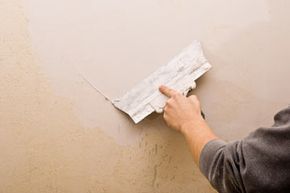\”
 \”Fixing that crack will keep smells and sounds from next door seeping in. Want to learn more? Check out these home construction pictures!iStockphoto/Thinkstock
\”Fixing that crack will keep smells and sounds from next door seeping in. Want to learn more? Check out these home construction pictures!iStockphoto/Thinkstock
Dr. Who fans might remember the spooky crack in Amelia Pond\’s bedroom wall that followed The Doctor through time and space. While a crack in your condo\’s shared wall might not be a crack in the fabric of the universe, it\’s still a good idea to fix it up.
A shared wall – also called a party wall or demising wall – is any wall in your unit that\’s also a wall in the unit next door. You probably know it as "that wall through which I can hear everything my neighbor is doing." Curtis Peart from FrontPorch, a company that\’s built condo complexes in Atlanta, explains that party walls are made in two parts: One supports one side and the other supports the other. It\’s basically two walls, and they reduce sounds, smells and even prevent fire damage in one unit from spreading to another, depending on code requirements.
Shared walls already mean shared sounds, but a crack in the wall can amplify them. A cracked party wall lets more sound through and can even let smells into the adjoining unit! "When you run the vent hood while you\’re cooking or even open the windows, you\’re sucking air out of your unit putting it in a negative pressure condition, and if you have less pressure than next door, you can suck in their stinky air," Peart says.
If a condo unit catches fire, the party wall protects the surrounding units. It does that by both keeping fire from spreading and preventing oxygen from next door from feeding the fire, Peart says. Cracks allow air through, so the bigger the crack, the bigger the hazard.
Leon Kurkjain at LPK Creations, a remodeling company in Atlanta, also points out that cracks in the wall can be a symptom of a structural problem. If the crack is larger than a "surface crack" – meaning that it\’s wide enough for you to insert even a piece of paper – you should talk to a structural engineer. You don\’t want to repair a crack only to have more appear because your building has a weak foundation.
Once you\’ve ruled out severe issues, you can repair surface cracks yourself. Peart recommends that you "tape and bed the crack" by applying drywall mesh tape over the crack, spreading drywall mud over the tape, letting it dry, then sanding and painting.
In the U.S. it\’s courteous to let your neighbor know before you start repairing a crack in a shared wall, but legally you own your side of the party wall, so you can do whatever you want to it without talking to your neighbor. It\’s a different story if you\’re messing with the inside of the wall, and how much of the inside of the wall you own depends on where the boundary line is [source: Romano]. Your home owners association should be able to tell you that, as it can vary.
In the U.K. and Wales, however, the Party Wall Act of 1996 says that you have to notify your neighbor of any work you do on a shared wall, even if it won\’t go past the center line [source: Communities and Local Government].
In general, if the crack in your wall doesn\’t look too severe, you\’re probably fine to repair it yourself, but for anything that looks like it\’s more than a surface crack, you\’ll want to have an expert take a look before you attempt any DIY repairs.
Author's Note
My husband and I just did quite a bit of construction on our own house, so when I got this assignment I knew I wanted to talk to the folks at FrontPorch. They did an amazing job on our addition, and I\’m so glad I contacted them!
Until I talked to Curtis Peart, the only information I was finding about a damaged party wall was the sound and smell issue. Those are definitely inconvenient, but the fire hazard that he pointed out eclipsed those minor annoyances. I am all about DIY, but I\’m also a safety first type of gal, so ruling out the worst case scenario before heading to the home improvement store strikes me as the most sensible way to handle a crack in the wall.
Related Articles
- 10 Reasons to Buy Homeowners Insurance
- Can you block neighbor noise in a townhome or condo?
- Do you need to contact your homeowners association when selling your house?
- How to Measure Square Footage
- What is the difference between a house, a mobile home, a condominium, a co-op, and a townhouse?
Sources
- Communities and Local Government. "The Party Wall etc. Act 1996: explanatory booklet." March 8, 2004. (July 10, 2012) http://www.communities.gov.uk/publications/planningandbuilding/partywall
- Kurkjain, Leon. LPK Creations. Personal Interview. July 11, 2012. http://www.lpkcreations.com/
- Peart, Curtis. FrontPorch. Personal Interview. July 12, 2012. http://yourfrontporch.com/
- Romano, Jay. "Condominiums" New York Times. Jan. 29, 2008. (July 10, 2012) http://topics.nytimes.com/topics/reference/timestopics/subjects/h/homeowner_resources/condominiums/index.html









